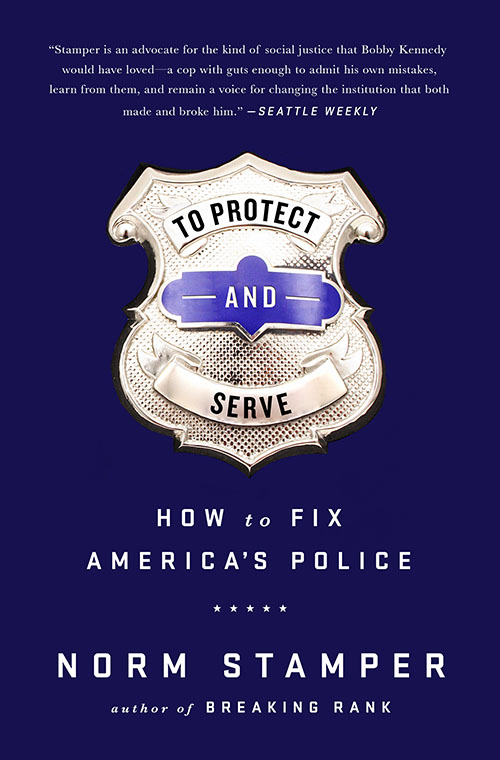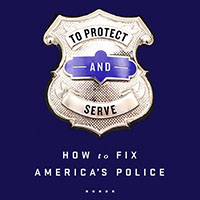PART 2: THE REVIEW
— by Lin McNulty —
 As I read and review Orcas Islander Norm Stamper’s new book, To Protect and Serve: How to Fix America’s Police (Nation Books, 2016), the media is reporting that Edward Nero, the second Baltimore police officer to stand trial in the Freddie Gray case, was found not guilty of all charges in connection with Gray’s death in 2015.
As I read and review Orcas Islander Norm Stamper’s new book, To Protect and Serve: How to Fix America’s Police (Nation Books, 2016), the media is reporting that Edward Nero, the second Baltimore police officer to stand trial in the Freddie Gray case, was found not guilty of all charges in connection with Gray’s death in 2015.
Nero, 30, was charged with second-degree intentional assault, reckless endangerment, and two counts of misconduct for his actions the day Gray, 25, suffered a fatal spinal injury in police custody.
Another non-guilty verdict. As these reports of shootings by white cops of young, more often than not unarmed, black males continue to run rampant across America, Stamper’s new book offers a solution, a process by which the face of American policing can find its way out of this seemingly contagious quagmire.
Stamper picks up and analyzes the historical bread-crumb evidence of law enforcement in this country, clearly building a case that undeniably outlines how we got here and why we need to change it. From the initial borrowing of Britain’s “hue and cry,” to the first nightwatchmen and slave patrols of the colonies, to the vigilantes of the American western frontier; to the Drug War and reliance on that revenue stream, to the massive local police militarization of the 21st Century, this book provides a much-needed opportunity to scrutinize these bread crumbs. And, then, to decide if this really where we want to be. He’s betting it’s not where we want to be, any of us.
But is it at all possible, to see how we might exit this out-of-control train, avoid that next threat around the corner, and adopt a system by which it may become clear that the police belong to us, the citizenry, and not the other way around? Is the continuation of police misconduct and nationwide payouts in excess of $1,000,000,000 (yes, billion; not a typo) a year acceptable, a given? Is that just the way the game is played now?
“Bad cop” is a well-known, accepted byword of modern policing. But “bad cop” has all too smoothly become systemic corruption and it’s time to recognize that and be a part of the solution. As Stamper says, from the soles of his well-worn gumshoes, “systemic, disciplined problem solving is at the core of true community policing.” Soldiers, he notes, “follow orders for a living, while cops make decisions for a living.” There is, and should be, a recognizable and accountable difference.
To Protect and Serve (release date: June 7, 2016) is a well-documented, timely, and solution-oriented treatise that culls from Stamper’s 34-year career in law enforcement wherein he learned from his and others’ mistakes; and from Sir Robert Peel who, in 1820, outlined Nine Principles for community policing that still ring true, and should still be the cornerstone of police practices even today.
We have 18,000 law enforcement agencies in the country, and only one Constitution, which more than 1,000,000 police officers have, each and all, sworn to protect. Now is the time to stop that train before it can travel any further down the tracks. Stamper offers citizens and the police a “safe harbor for raw, bone-honest conversations,” with the potential to openly discuss this situation, not only locally, but nationally.
Read it. It’s about all of us.
To Protect and Serve: How to Fix America’s Police (Nation Books) is scheduled for release on June 7. Watch for news of upcoming book signing at Darvills.
PART 1: THE INTERVIEW
**If you are reading theOrcasonian for free, thank your fellow islanders. If you would like to support theOrcasonian CLICK HERE to set your modestly-priced, voluntary subscription. Otherwise, no worries; we’re happy to share with you.**









I find this article interesting. Have you stopped to look at today’s society and its actions? Our society has changed so much in the last 10 years and it is unfortunate it has taken this road.
Yes there are “Bad Cops” who tarnish the job many of us love, and take pride in. Those “Bad Cops” do get caught. I suggest you get off the Island and do a ride along with Seattle PD, Mt Vernon Police, and Bellingham Police. Find out what they do for Community Policing. Plus I want you to see the actions of those who target Police Officers to get them to lose their temper. You ever had your loved ones threatened with physical and bodily harm? Just for doing your job? If so how did you feel about it? It sucks but you do become numb to it.
This article makes it out to sound as if all law enforcement officers are bad. Really appreciate the typical media stereo typing
Great review Lin! Congrats to Norm, we look forward to reading your book!-Ron and Rebecca Herman
Mr. Timmins wrote, “…This article makes it out to sound as if all law enforcement officers are bad. Really appreciate the typical media stereo typing”
My immediate feeling is that Mr. Timmins must’ve read a different article from the one I just finished. I got no such impression.
I do agree that, since we as a culture no longer teach politeness and personal responsibility, today’s police officers face concerted efforts by cop-baiting fools which are calculated to provoke over-reaction.
I am pleased to note that the sought-for over-reaction is only very occasionally the result. Police training against reacting to provocation must be pretty good, by and large.
I had a great deal of trouble sorting out what was Lin Mcnulty’s point of view and what was the review of Mr. Stamper’s book. If this was unclear to anyone else than I’m afraid Orcas Issues has done a disservice to its readers.
thank you norm,lin,linda,
as always i look forward to Mr stamper’s latest book and will make my mind up upon reading.